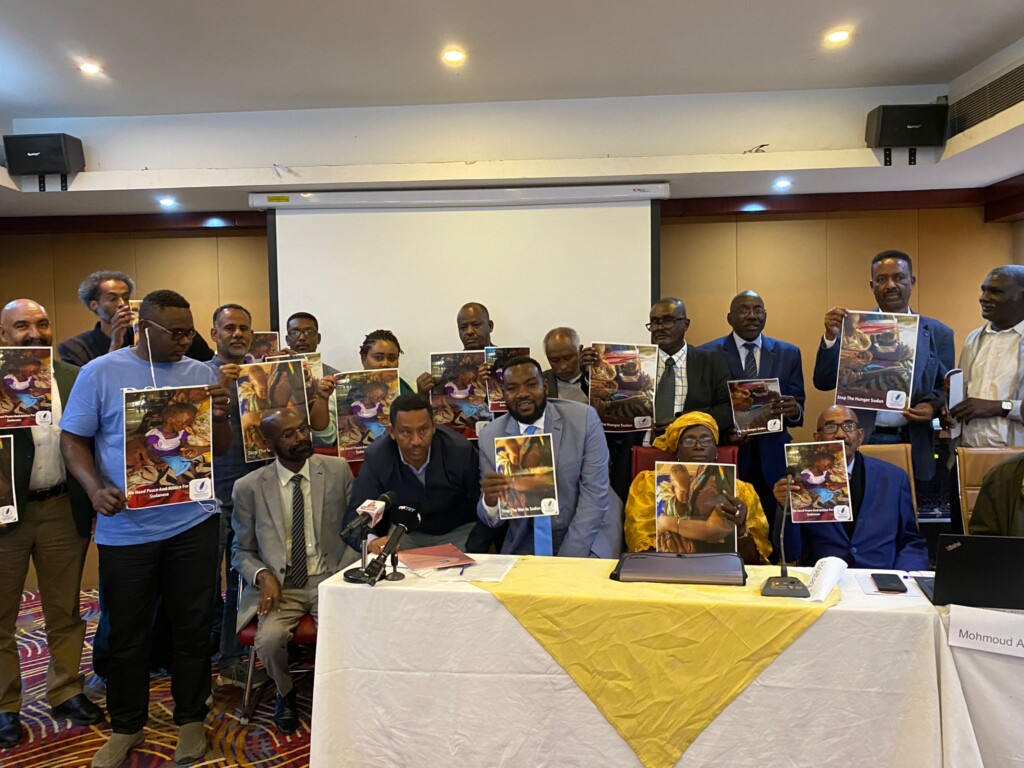Civil society orgs urge AU military intervention in Sudan

Representatives of African civil society organisations after their meeting on Sudan, Addis Ababa, February 17 (Photo: Ashraf Abdelaziz / Dabanga)
Representatives of Sudanese and African civil society organisations held a consultative meeting on the sidelines of the annual African Union summit in the Ethiopian capital on Friday. They urged the AU to send a military force to stop human rights violations and ensure the arrival of humanitarian aid.
Dabanga correspondent Ashraf Abdelaziz reported from Addis Ababa, where the annual AU summit’s 37th Ordinary Session opened yesterday, that the meeting of the CSOs concluded with a statement in which they condemned “the ongoing violent confrontations between the Sudanese Armed Forces (SAF) and the Rapid Support Forces (RSF) and its allied militias”.
The statement referred to multiple crimes against civilians, including arbitrary executions, detention, torture, sexual violence, and violations of freedom of expression and assembly, particularly targeting peace activists and humanitarian workers. It criticised the Sudanese military command’s disregard for international warnings about human rights, especially the joint warning by 30 United Nations experts on the situation in Sudan issued on February 5.
More than 20,000 people have been killed in Sudan since the SAF-RSF battles erupted in mid-April last year, about 11 million people fled their homes, nearly 25 million people, one third of the population, suffer from acute malnutrition, and about 80 per cent of health care facilities in conflict areas have stopped operating.
In their statement to the AU, the CSOs called on the “African statesmen participating in this session of the African Union Assembly” to condemn the violence, demand a ceasefire, put pressure on the warring parties to end the conflict, send a military force to stop human rights violations and ensure the arrival of humanitarian aid, and establish a mechanism to monitor and document human rights violations.
The AU should “activate Article 4 of its Constitutive Act and dispatch a military force to end the gross violations of human rights and humanitarian law, including war crimes, crimes against humanity, and acts of ethnic cleansing occurring in Sudan”.
The African leaders should further take “immediate measures to ensure the establishment of humanitarian corridors to deliver necessary relief materials to populations in need without delay, especially in Darfur”.
African countries and international actors are to be mobilised to put pressure on the warring parties and force the leaders of the warring parties to put an immediate end to the conflict and to establish a monitoring mechanism concerning on the widespread violations of human rights and international humanitarian law by members of both warring parties, with particular attention to the situation in Darfur.
Absent on agenda
As Dabanga reported on Friday, the Sudan war is missing on the agenda of the current AU summit. Africa Intelligence stated two days earlier that “None of Africa’s pressing political and security crises, such as those in Sudan, Ethiopia or the Sahel, are on the agenda of this weekend’s continental gathering. Instead, leaders are set to focus on drier matters such as internal reforms and Agenda 2063”.
Abdelbagi Jibril, Sudanese human rights expert and director of the Darfur Relief and Documentation Centre in Geneva, referred to this “significant omission” at the opening of the consultative meeting. For this reason, “the civil society organisations are intensifying their pressure so that the sounds of the Sudanese’s sufferings can be heard within the summit,” he said.
He also expressed his regret about relief materials not reaching those affected by the violence.
Jibril further praised the stance of the AU towards Sudan but said that “the union needs better briefings to erase its misconceptions”, citing that “the AU was one of the staunchest defenders of the Al Bashir government as a result of the misinformation it was given”.
According to Hannah Forster, director of the Gambia-based African Centre for Democracy and Human Rights Studies, the Sudan crisis results from previous accumulations and the neglect by African institutions of civil society organisations’ warnings about the danger of Al Bashir government (1989-2019) and its formation of the Janjaweed militias.
Abdelaziz also cites Ibrahim Hamed, director of the London Media Centre, who said in his address to the meeting that “The real crisis is the fragmentation of solutions,” resulting from “the discrepancy between the political forces that appeared since independence”.
On 21 December last year, the UN Security Council unanimously adopted a resolution that created a framework to fund AU peace operations. Some diplomats have suggested using this framework to backstop a ceasefire monitoring force should Sudan’s belligerents stop fighting, though they acknowledge such a mission would be difficult to carry out, Crisis Group experts Daniel Forti and Liesl Louw-Vaudran stated in an analysis last week.











 and then
and then